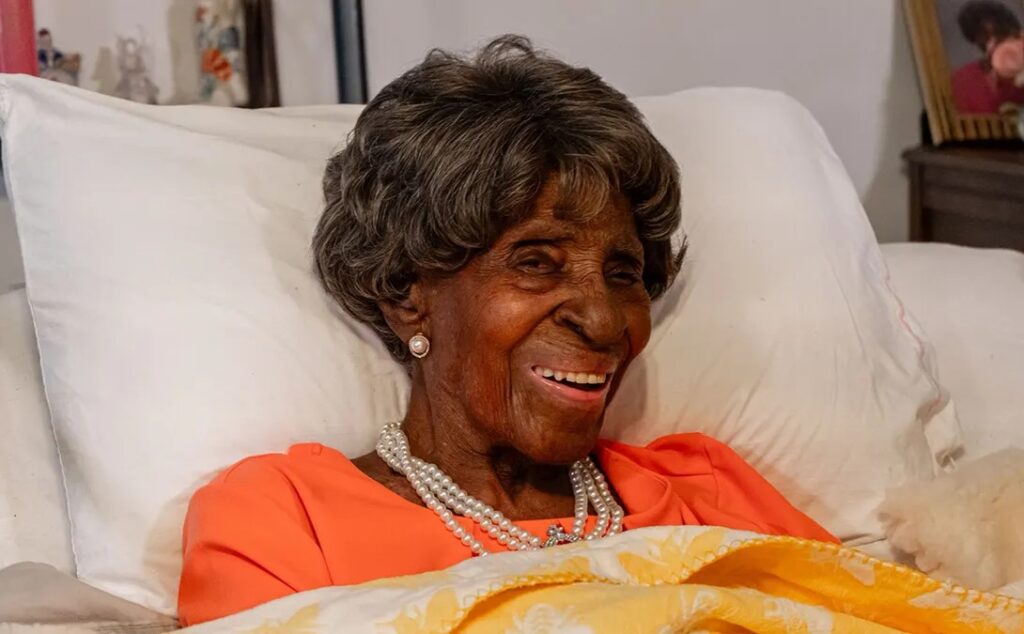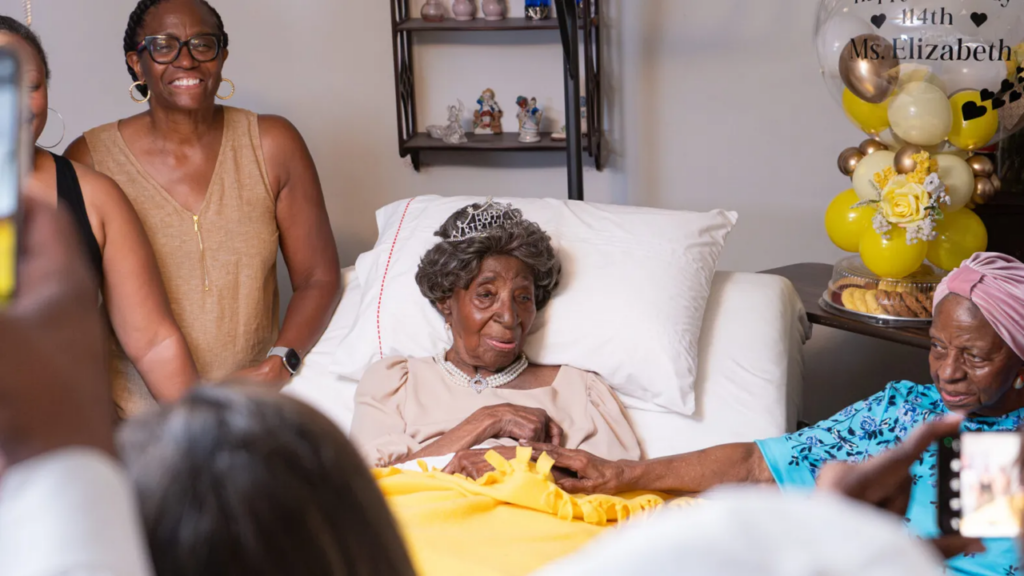 Known by her nickname, “The Queen Elizabeth of Houston,” Elizabeth Francis passed away this week at age 115, making her the oldest person in the United States and the third oldest person in the world.
Known by her nickname, “The Queen Elizabeth of Houston,” Elizabeth Francis passed away this week at age 115, making her the oldest person in the United States and the third oldest person in the world.
While Francis was asked about her secret to longevity when she spoke with Today.com in August, the grateful great-great-grandmother responded, “It’s not my secret. It’s the good Lord’s blessing. I just thank God I’m here.”
“Try to do the best thing you can to everybody,” she told the morning show. “Love everybody.”
During her certification as the oldest living person in the country, Francis told LongeviQuest, an organization that tracks human longevity, that her life advice is: “If the good Lord gave it to you, use it! Speak your mind, don’t hold your tongue!”
Her Advice for Living Long is Actually Medically-Sound
Speaking your mind and not stressing about things like Francis said is actually healthy for you and plays a role in how long you live.
In a new study, Yale researchers conducted research to answer two questions: How much does chronic stress accelerate that biological clock? And are there ways to slow it down and extend a healthy lifespan?
According to their findings, published in the journal Translational Psychiatry, stress does indeed make one’s life “clock” tick faster — but individuals can help manage the factors that cause this acceleration by strengthening their emotion regulation and self-control.
Rajita Sinha, the Foundations Fund Professor of Psychiatry at Yale, a professor of neuroscience and professor at the Yale Child Study Center, and one of the authors of the study, has spent decades studying stress and the myriad and pernicious ways that it erodes our mental and physical health.
Prolonged stress, for instance, increases the risk of heart disease, addiction, mood disorders, and post-traumatic stress disorder, said Sinha, who is also director of the Yale Interdisciplinary Stress Center. It can influence metabolism, accelerating obesity-related disorders such as diabetes. Stress also saps our ability to regulate emotions and to think clearly.

Her Life Story is One that Should Be Celebrated
Born in 1909 in St. Mary Parish, Louisiana, Francis saw a lot in her lifetime. She witnessed 20 presidents, two world wars, a segregated society and the civil rights movement, all in real-time.
On her 115th birthday this year, Francis received a letter from Barack and Michelle Obama, who acknowledged her contributions and the history she lived through.
“Over the course of one century, you have made extraordinary memories and woven your own unique story into the American narrative,” the letter said. “You are part of a generation who summoned the compassion and strength to guide our country through some of our greatest challenges and triumphs, and we trust you take tremendous pride in all you have contributed to our great nation.”
Francis experienced loss early in her life when her mother died in 1920. She was then moved to Galveston, Texas, where she was raised by her aunt. Her other five siblings were split up to different homes.
In 1928, Francis gave birth to Dorothy Williams, her only child, and raised her as a single mother.
Her life was spent looking after others, working at her church and running a coffee shop at TV station KTRK for over 20 years. Houston was home for most of her life.
“My grandmother was also a caregiver,” Harrison said. “She took care of her brothers, her sisters and her dad. That was part of her life.”
In 1999, it became time for her loved ones to take care of her. Francis moved in with her daughter and granddaughter when she was 90. She was there for 25 years before quietly passing Tuesday night.
“She never learned to drive, so she took the bus to work, or people in the family would give her a ride,” Harrison, told The Dallas Morning News in 2023. “She also did a lot of walking, so maybe that explains some of her longevity.”
How Her Walking Does More than You Think
So seeing elderly people walk around the mall or take long walks on trails isn’t just to keep them active, it’s been proven to help people live longer.
Through exercise, glucose is metabolized in the muscles and converted into energy: “Regular walking can also help to lower and stabilize blood sugar levels. This is particularly beneficial for people with insulin resistance or type 2 diabetes,” says Christiane Mensching, a specialist in general medicine, geriatrics, and preventive medicine.
In a 2011 research study, participants who walked over an hour per day have a longer life expectancy from 40 years of age than participants who walked less than one hour per day. The life expectancy for those who walked less than an hour per day was 44.81 years. In addition to their longer life expectancy, participants who walked greater than an hour per day required a lower lifetime medical expenditure from 40 years of age than participants who walked less than an hour per day.
Compared with a group of people logging almost 4,000 steps daily, risk of death from any cause was reduced by:
– 49% for 5,500 steps;
– 55% for 7,400 steps; and
– 67% for 11,500 steps a day.
For deaths from cardiovascular causes, compared with about 2,350 steps a day, risk fell by:
– 16% for 4,000 steps;
– 49% for 6,700; and
– 67% for 10,400 steps a day.
Additional real-life benefits of walking include:
Reduced risk of death: A meta-analysis found that people who walked more had a 40–53% lower risk of death than those who walked less. A study found that walking 1,000 extra steps a day can be very important, and that every 500 steps taken was associated with a 7% decreased risk of death from cardiovascular causes.
Improved mental health: Walking can reduce the odds of becoming depressed. Walking releases endorphins, which can improve mood and promote relaxation.
Reduced risk of dementia, stroke, and heart disease: Walking can help reduce the risk of these conditions.
Strengthened muscles and bones: Walking can help strengthen your muscles and bones.
Granddaughter Harrison added, “Her life was always pretty simple: early to bed, early to rise, work hard, then come home and make a nutritious meal and be with family.”
The supercentenarian isn’t the only one in her family who lived to be older than 100, however, as Francis’ sister Bertha Johnson died at 106 years old in 2011.









